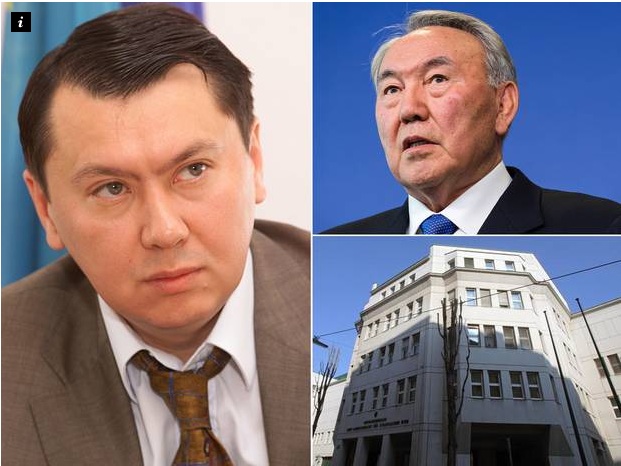 Prison authorities discovered his corpse at 7.20 on a Tuesday morning late last month. Rakhat Aliyev's body was hanging from a noose made from gauze bandages which had been attached to a peg in the cell's shower unit. Aliyev, the former son in law and prominent millionaire opponent of the autocratic Kazakh president, was found dead in his solitary cell in the hospital unit of the Josefstadt prison in Vienna in circumstances that might have been lifted from the pages of a John Le Carré spy novel.
Prison authorities discovered his corpse at 7.20 on a Tuesday morning late last month. Rakhat Aliyev's body was hanging from a noose made from gauze bandages which had been attached to a peg in the cell's shower unit. Aliyev, the former son in law and prominent millionaire opponent of the autocratic Kazakh president, was found dead in his solitary cell in the hospital unit of the Josefstadt prison in Vienna in circumstances that might have been lifted from the pages of a John Le Carré spy novel.
Suspicions that he could have been the victim of a political assassination have obliged Austria to launch an independent judicial inquiry into the mysterious Vienna prison "suicide".
The 53-year-old, who served both as Kazakh ambassador to Vienna and as the deputy head of his country's secret services, had been awaiting trial for the alleged murder of two Kazakh bankers, having turned himself into the authorities last June. Austria refused to extradite him because of Kazakhstan's poor humans right record.
"He hanged himself," said the prison governor, Peter Prechtl, following an initial inquiry.
The prison authorities based their conclusion on evidence provided by video cameras placed over the doors of all jail cells which record the comings and goings of visitors. Aliyev, they insist, was last seen alive shortly before 10pm the previous evening during a routine distribution of medicines to prisoners.
Mr Prechtl said that for the next nine hours there was no evidence that anyone had entered Aliyev's cell or that the video system had been manipulated.
However, Aliyev's lawyers maintain that there is a wealth of evidence which fails to fit the prison's assumptions: "We are convinced that his death was not a willing suicide," Klaus Ainedter, one of the lawyers, said in Vienna last week. "The circumstances surrounding his death fail to support such a conclusion," he added.
Mr Ainedter said that only hours before his death, Aliyev had been looking forward to testifying in another case against two fellow prisoners who he said had threatened to kill him and make it look like suicide unless he paid them protection money.
The prison had moved him into solitary confinement in the hospital wing to remove him from them. Aliyev had also booked a session with the prison barber on the Tuesday morning and was happy at the prospect of a visit from his wife and children.
His widow, Elnara, speaking from the Aliyev family home in Malta, insisted that it was "out of the question" that her husband would have taken his own life. "He loved his family far too much to do so and would never have deserted us," she said.
Aliyev's lawyers said that their client was known to take barbiturates to help him sleep and an initial autopsy had shown that his body contained traces of a powerful sedative that can be lethal if taken in high doses. The lawyers have asked for a second autopsy to be carried out to establish exactly how much of the drug was in his body and whether it could have caused his death.
They also point to a conflict of interests as the doctor who carried out the first autopsy was listed as a witness for the prosecution in Aliyev's murder trial.
In an effort to establish the cause of Aliyev's death, Austria's Justice Minister, Wolfgang Brandstetter, has set up an independent commission to investigate the case. "The commission is meant as an additional guarantee that we are using objective criteria and taking the right investigative steps," a justice ministry spokesman said.
Aliyev's first marriage to Dariga Nazarbayeva, the daughter of the President Nursultan Nazarbayev, helped him to gain national prominence and he was appointed to several high ranking posts including vice-Foreign Minister and chief of the Kazakh tax police. At one time he was in line to become his father-in-law's successor.
However, in January 2007, Aliyev became a director of the Kazakh bank Nurbank. Shortly afterwards the bank's president and chairman went missing. Aliyev was charged the following May with kidnapping the two bankers and was dismissed from Nurbank. But by then he was in Austria, serving as his country's ambassador.
In 2008, the Kazakh courts convicted him in absentia of kidnapping, treason and plotting a coup against the president. The bodies of the two bankers were found in 2011, prompting the Kazakh authorities to accuse Aliyev of murder and demand his extradition to stand trial. Austria refused, citing Kazakhstan's poor human rights record, but it agreed to prosecute Aliyev in Austria.
However, a Kazakh organisation called Tagdyr, which is representing the families of the dead Kazakh bankers at the trial, is strongly suspected by Austrian state prosecutors of being a cover organisation for the Kazakh secret service which answers directly to President Nazarbayev. Tagdyr's Austrian lawyer disputes the allegations.
Before his death Aliyev was adamant that he had nothing to do with the two bankers' kidnapping and deaths and that he was the victims of a political conspiracy conducted by the president.
"Nazarbayev is really the murderer," he told the Austrian magazine Profil in 2007. "He wants to discredit me in order to silence the voice of opposition. There is a system behind this," he insisted.
independent.co.uk, Sunday 15 March 2015




